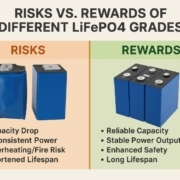The growing popularity of LiFePO4 (Lithium Iron Phosphate) batteries in solar energy storage, RVs, and off-grid setups has brought a flood of suppliers into the market. It’s tempting, especially for DIYers and budget-conscious buyers, to grab the cheapest deal. But beware — that bargain pack of cells labeled “Grade A” at suspiciously low prices might actually be low-grade or even rejected cells. The short-term savings could cost you big in the long run. how to protect from Battery Scam?
The Trap: Why Cheap Batteries Can Cost You More
There’s a reason reputable suppliers and certified manufacturers charge more for Grade A LiFePO4 cells. High-quality cells are rigorously tested for consistency in capacity, internal resistance, cycle life, and safety. Low-grade or Grade C cells often fail these tests — they’re the factory rejects, excess stock, or even refurbished cells passed off as new.
Unscrupulous sellers know that most buyers can’t test cells themselves. They slap a “Grade A” sticker on low-quality cells and move inventory fast. Once the battery pack fails or causes problems, it’s too late.
Performance Issues: The Hidden Cost of Low-Grade Cells
1. Unexpected Capacity Drops:
Low-grade cells often have inconsistent capacity ratings. You might think you’re getting 100Ah, but in real-world use, you may only get 70–80% of the advertised capacity — if that.
2. Inconsistent Power Output:
Cells with mismatched internal resistance or degraded chemistry can’t deliver stable power. You’ll notice fluctuations, poor performance under load, or even sudden shutoffs — not ideal if you rely on your batteries for critical energy needs.
Safety Hazards: A Risk You Shouldn’t Ignore
LiFePO4 batteries are known for their thermal stability — they’re among the safest lithium chemistries out there. But when cells are low-grade, damaged, or have internal defects, safety goes out the window.
Overheating & Swelling: Poor-quality cells are more prone to swelling due to gas buildup. They can overheat during charging or discharging, increasing the risk of thermal runaway.
Fire Risks: While rare for good LiFePO4, there have been documented incidents where cheap, poorly made cells caught fire because of internal short circuits.
Shortened Lifespan and Financial Losses
Imagine spending hundreds or thousands of dollars to build or buy a battery bank, only to have cells fail after a few months. Low-grade cells can lose capacity rapidly, dropping below usable levels in a fraction of the cycles you’d get from genuine Grade A cells.
What’s worse, a single bad cell can drag down an entire battery pack — meaning you may have to replace the whole thing. So, that “cheap” deal can turn into double or triple the cost over time.
How to Protect Yourself: Smart Buying Steps
Don’t get scammed — here’s how to safeguard your project and your wallet:
✅ Do Your Due Diligence: Research suppliers thoroughly. Check reviews, forums, and independent test reports.
✅ Verify Supplier Claims: Reputable sellers will share the factory test reports, including capacity, internal resistance, and cycle life data. Don’t hesitate to ask.
✅ Look for Certifications: Ensure the cells meet international safety standards like UN38.3, IEC, or UL certifications.
✅ Inspect on Arrival: Check the physical condition of cells. Look for dents, swelling, corrosion, or mismatched labels.
✅ Run Your Own Tests: If you have the tools, test cells for capacity and internal resistance before building your pack.
✅ Work with Trusted Partners: Sometimes it’s worth paying a local representative or battery expert to vet suppliers and inspect shipments, especially for bulk orders.
Real-World Examples: When Cheap Batteries Go Bad
🔍 Case in Point:
A small off-grid community bought a pallet of “Grade A” LiFePO4 cells from an unknown online supplier. Within six months, over 40% of the cells were swollen and underperforming. When they tried to claim a warranty, the seller disappeared. They ended up paying twice — once for the junk cells, and again for new, certified replacements.
🔍 Another Example:
A DIYer on a popular solar forum shared photos of cells they’d bought at a discount. They discovered old weld marks under the heat shrink — the cells were clearly recycled from old packs. This can pose both performance and safety issues.
Final Thoughts: Spend Smart, Not Cheap
LiFePO4 batteries are a great investment — but only if you buy quality. When it comes to energy storage, you truly get what you pay for. A cheap battery today can become a costly, even dangerous headache tomorrow.
So, be cautious. Ask questions. Demand data. And when in doubt, remember: a trusted supplier might cost more upfront, but they’ll save you thousands in headaches down the road.
Frequently Asked Questions
Q: Are all Chinese LiFePO4 cells low-grade?
Q: How can I tell if a cell is Grade A or C?
A: Without testing, it’s hard. That’s why factory test reports, supplier transparency, and independent verification matter so much.
Q: Is buying refurbished or used cells ever worth it?
A: For non-critical applications, maybe. But always expect lower performance and a shorter lifespan — and never use them for applications where reliability is crucial.






